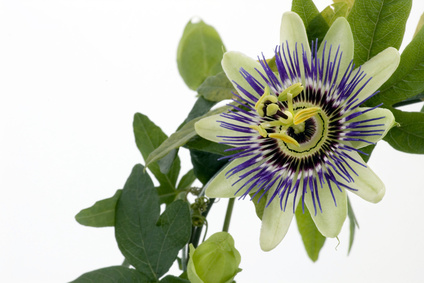
Passiflora incarnata (L)
 Synonyms: maypop, grenadille, granadilla, maracoc, passion vine, purple passionflower
Synonyms: maypop, grenadille, granadilla, maracoc, passion vine, purple passionflower
Order: Passifloraceae
Description: Passiflora is a native of North America but is also cultivated in cooler climates. It is a woody, hairy, climbing vine whose stems, 3-10m long, climb by means of axillary tendrils. The alternate, serrate leaves are palmately three- to five-lobed. Solitary, axillary, white flowers with a purple, blue or pink calyx crown bloom from May to July. The fruit is an edible, many-seeded berry (maypop) almost as large as a chicken egg.
Parts used: aerial parts
Collection: The leaves are collected before flowering, between May and July, or with the fruit after flowering.
Constituents: flavonoids (including saponarin, saponetin, vitexin, isovitexin, orientin, iso-orientin), sterols, cholorogenic acid, maltol, gynocardin, volatile oil, traces of alkaloids (including harmine, harman, harmol, harmaline, harmalol, harmane, passiflorine), sugars, gum
Actions: sedative, hypnotic, antispasmodic, diaphoretic, anodyne, anxiolytic, peripheral vasodilator, hypotensive.
Indications: insomnia, sleep disorders, restlessness, irritability, nervous stress, anxiety, neuralgia, generalised seizures, hysteria, nervous tachycardia, spasmodic asthma, conditions of high nervous or visceral tension or spasm.
Therapeutics and Pharmacology: Passiflora is commonly used in the treatment of nervous conditions, and is normally administered as part of a prolonged treatment. It helps in the treatment of intransigent insomnia, by aiding the transition into a restful sleep without any 'narcotic' hangover. The alkaloids and flavonoids are reported to have tranquillizing effects. It may be used wherever an antispasmodic is required, e.g. in Parkinson's disease, seizures and hysteria and is effective in the relief of nerve pain in neuralgia and shingles. It is also of benefit in asthma where there is much spasmodic activity, especially when there is associated tension. Passiflora is often used as a supportive drug, and is found in many tea mixtures and proprietary herbal medicines.
Combinations: With Valeriana, Humulus and Piscidia for insomnia
Caution: Avoid high doses in pregnancy.
Preparation and Dosage: (thrice daily)
Regulatory Status: GSL
Dried herb: 0.5-2g or by infusion
Liquid extract: 1:1 in 25% alcohol, 0.5-2ml
Tincture: 1:8 in 25% alcohol, 2-4ml
Additional Comments: The name Passionflower arose because the corona resembles Christ's crown of thorns.
Bibliography
Bradley, P.R. (ed.) 1992 British Herbal Compendium, Volume 1, BHMA, Bournemouth.
BHMA 1983 British Herbal Pharmacopoeia, BHMA, Bournemouth.
Grieve, M. 1931 A Modern Herbal, (ed. C.F. Leyel 1985), London.
Hoffmann, D. 1990 The New Holistic Herbal, Second Edition, Element, Shaftesbury.
Lust, J. 1990 The Herb Book, Bantam, London.
Mabey, R. (ed.) 1991 The Complete New Herbal, Penguin, London.
Mills, S.Y. 1993 The A-Z of Modern Herbalism, Diamond Books, London.
Ody, P. 1993 The Herb Society's Complete Medicinal Herbal, Dorling Kindersley, London.
Polunin, M. and Robbins, C. 1992 The Natural Pharmacy, Dorling Kindersley, London.
Weiss, R.F. 1991 Herbal Medicine, Beaconsfield Arcanum, Beaconsfield.
Wren, R.C. 1988 Potter's New Cyclopaedia of Botanical Drugs and Preparations, C.W.Daniel, Saffron Walden.










